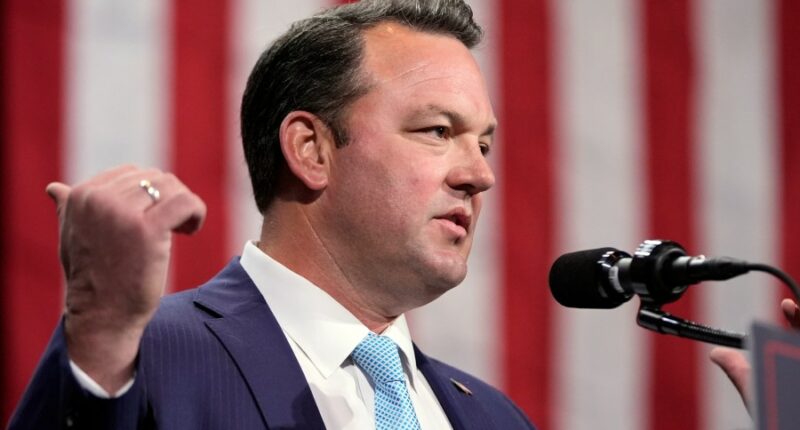Share this @internewscast.com
ATLANTA (AP) — On Thursday, one leading Republican contender for Georgia governor filed a lawsuit against another key GOP candidate, disputing the legality of the opponent’s campaign financing methods.
Georgia Attorney General Chris Carr initiated legal action against Lt. Gov. Burt Jones in federal court in Atlanta, petitioning the judge to bar Jones from utilizing funds from his leadership committee. This special fundraising entity permits Georgia’s top officials, including the governor and legislative leaders, to gather unlimited donations.

Jones and Carr are in the race for the Republican nomination to replace Gov. Brian Kemp, who cannot run again due to term limits. The GOP primary is slated for May, with the general election set for November 2026, expected to be one of the priciest governor’s races nationwide.
Carr claims that the leadership committee infringes on his First Amendment right to free speech and his 14th Amendment right to equal protection because it favors Jones by enabling a fundraising setup that restricts Carr’s spending. The state law from 2021 that established these leadership committees does not permit Carr or other candidates to use this fundraising mechanism. Carr is limited to a standard campaign committee, which can collect no more than $8,400 per donor for the primary election and $4,200 for a potential primary runoff.
Carr’s spokesperson Julia Mazzone accused Jones of exploiting his role to circumvent donation limits, securing massive contributions during legislative sessions, and channeling unrestricted funds into the primary through a structure unique to him.
Jones’ campaign spokesperson Kendyl Parker criticized Carr as being hypocritical since his office defended the law in 2022, which he now contests. Carr maintains that his duty as attorney general is to defend laws that are challenged, irrespective of personal views. Parker did not comment directly on Carr’s lawsuit claims.
Carr announced his run for governor last year, saying he needed longer to raise money because he isn’t personally wealthy. Carr’s campaign has been voicing concerns for months that Jones will use his leadership committee and family wealth to win the primary. The Carr campaign tried to get the state Ethics Commission to investigate the source of a $10 million loan that Jones made to his leadership committee, but the commission declined, saying Carr failed to allege a legal violation.
Carr’s campaign cited a 2022 federal judge’s ruling that a leadership committee for Kemp could not spend money to get Kemp reelected during the Republican primary that year. U.S. District Judge Mark Cohen found that the “unequal campaign finance scheme” violated challenger David Perdue’s First Amendment right to free speech.
But Carr wants much more extensive restrictions on Jones’ leadership committee than Cohen ordered. Cohen let Kemp keep raising money for the leadership committee, just saying Kemp couldn’t spend it against Perdue. But Carr wants a judge to cut off both fundraising and spending until the primary is over.
He also asks that a federal magistrate judge be appointed to oversee all spending by the committee and that Jones’ regular campaign committee repay any money already spent by the leadership committee to support Jones. Carr asks the court to block Jones from giving any cash to dark money groups and making any loans to his regular campaign committee during the primary, and wants the magistrate judge to investigate where Jones’ $10 million loan came from. Carr has pointed to a 2022 financial disclosure that showed Jones didn’t have enough liquid assets to loan his campaign that much.
Carr’s campaign continues to voice concern that Jones could raise unlimited sums to repay his loan and then give the repaid money to his candidate committee to spend in the primary, warning that such laundering would destroy campaign contribution limits.
Carr’s campaign has also asked the Ethics Commission for an advisory legal opinion on whether Jones’ activity is legal.










